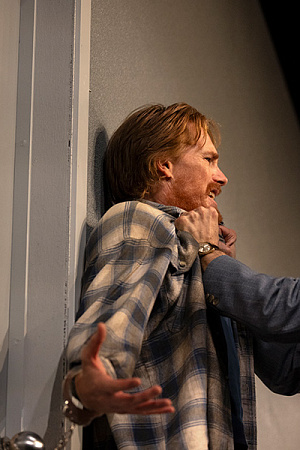My Dearworthy Darling (Malthouse Theatre and THE RABBLE)
In the beginning there is the sound of deep breathing and heartbeat. Woman, the electric Jennifer Vuletic, lies writhing on a rock, splayed as if for sacrifice. Is she in a state of anguish or ecstasy? My Dearworthy Darling ushers us into a space fraught with uncertainty, the kind where questions beget more questions. Fortunately, we are in the deft hands of THE RABBLE, a feminist theatre collective that rejects theatre as a comfortable form of entertainment. The play is an amalgam of the ‘holy theatre’ that Peter Brook wrote of in his ground-breaking work The Empty Space (1968) and the deconstructing feminist gaze of Caryl Churchill.
Directors Emma Valente and Kate Davis have positioned My Dearworthy Darling as a highly embodied work; Vuletic is ablaze with the physicality of her role. But language is its anchor and its wings. Alison Croggon – poet, dramatist, author, critic – has produced a radical new work, one that merges realms of the sublime and the prosaic. As Woman confesses, ‘I’ve lost the words / I don’t know if I ever had the words.’ And yet, this is a play fecund with them. Words are feverish with visions and poetry. Devotional words in Middle English are recited as incantations by a cowled Chorus. Words are accusatory weapons that obliterate.
And then there are the words that would make one howl with laughter, if only their deadening emptiness weren’t the kind we have come to hear from world leaders on a daily loop. As messenger of these statements, Woman’s sister, Natalie Gamsu (Ladies in Black) delivers them with great relish. ‘They reckon history is coming back … I mean that it stopped for a while and now it’s started again.’ This natural register of speech appears in conversations between Woman, her husband, and her sister, most of which operate on different frequencies. Ben Grant (Hir), as a seething husband with a fading career as an insurance agent, a man riddled with incomprehension – of the world, of his wife – is frightening in his white hot rage, even as he is hyperreal.
Continue reading for only $10 per month. Subscribe and gain full access to Australian Book Review. Already a subscriber? Sign in. If you need assistance, feel free to contact us.











Leave a comment
If you are an ABR subscriber, you will need to sign in to post a comment.
If you have forgotten your sign in details, or if you receive an error message when trying to submit your comment, please email your comment (and the name of the article to which it relates) to ABR Comments. We will review your comment and, subject to approval, we will post it under your name.
Please note that all comments must be approved by ABR and comply with our Terms & Conditions.